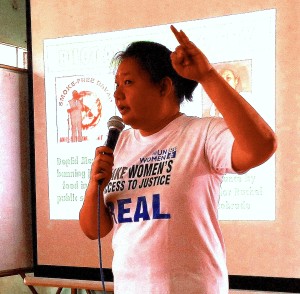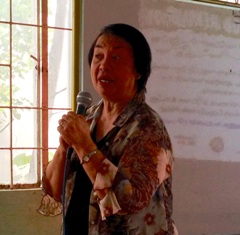By CARLO FIGUEROA
DAVAO CITY—Kalabasa (squash) pancakes, camote doughnuts, lemongrass and ginger juice.
They sound like they’re part of a menu for adults on a special diet. But in reality, these recipes will soon be available for students, especially in public schools in this city.
Thanks to its Food Revolution project, Davao City tries to follow the mantra of wellness by introducing healthy items such as these in school cafeterias and even in stores near schools.
The project is an advocacy campaign promoting access to healthy food in schools and communities. Organized by the nongovernmental Mindanao Commission on Women’s (MCW) Mothers for Peace movement and the Davao City government, the campaign targets school children whose health can be compromised because of junk food.
“Chronic malnutrition, micronutrient deficiencies and frequent illnesses can lead to poor school performance that would consequently lead to children dropping out of school early,” said Mindanao Commission on Women program officer Patricia Ruivivar during the project launch in Barangay Matina Crossing.
The project follows on a Department of Education order prohibiting the sale of junk food in public elementary and secondary schools.
In 2007 the DepEd released Order 8 Series of 2007 stating that “the sale of carbonated drinks, sugar-based synthetic or artificially flavored juices, junk food(s) and any food product that may be detrimental to the child’s health,” and those that do not have the SangkapPinoy seal or the Bureau of Food and Drugs approval is prohibited.
Davao City plans to take this directive one level higher as the city council has set on third and final reading an ordinance banning the sale of junk food not just in all elementary and high school cafeterias, but also in commercial stalls and establishments within 100 meters from schools.
“But school officials can find it challenging fully complying with these directives since there is a lack of supply of affordable healthy food for their canteens,” Ruivivar said.
With this in mind, the MCW teamed up with the city government and the DepEd to organize women in the barangays to grow organic vegetables and fruits in their backyards and community gardens. The partners also started training them to prepare healthy kid-friendly recipes for snacks and meals.
Once the women are ready, the project assists them in starting their food cart business and links them with DepEd and public schools in their barangays as suppliers of healthy food in the school canteens.
“So aside from addressing malnutrition and food security, this project offers an alternative solution to the lack of women’s livelihood opportunities in the community,” Ruivivar said.
“By presenting them these economic development opportunities, we do not just give them jobs. We give them an opportunity to create wealth,” said MCW chair emerita Irene Santiago who led the project launch.


One can start in the food cart business for as low as P10,000. This cost includes the cart, some food items to start with, the packaging and marketing cost. The good part is, it is payable in one year.The MCW has even forged an agreement with pilot barangays to guarantee the payment of the food carts availed by women beneficiaries using their gender and development fund.
The project sounds promising in that two foreign governments have expressed their support: Australia helped in funding the startup in 2012, and the Canadian Embassy supported the project’s launch in the pilot barangay of Matina Crossing.
“Food is a message that sells itself, especially when there’s livelihood attached to it,” Canadian embassy political and economic relations counselor Jamie Christoff said.
“We support efforts that provide meaningful jobs to women and opportunities for the youth. We also see this as addressing the fundamental human right to healthy food,” he added.
But some challenges remain: Like in any other revolution, getting started is not easy. “Changing eating habits is a very slow process especially in a fast-food (instant) culture,” Ruivivar said. “Plus resistance from the junk food industry is really strong.”
MCW was able to lobby the city government to adopt the Food Revolution project as a flagship project of the city’s health and wellness program. Healthy recipes under the project are now being compiled for joint publication with the Department of Science and Technology’s Regional Nutritional Council.
Davao City has been at the forefront of several innovative local programs and initiatives. Aside from this campaign against junk food, it is known to implement ordinances against firecrackers, smoking and aerial spraying.
“We plan to engage the policy and operational units of Davao City in this important public health issue. I am aware of the city’s track record in successfully conducting public health campaigns,” Ruivivar said.
And yes, the malunggay polvoron is tasty too.
(Carlo Figueroa is the Public Affairs Officer of the Embassy of Canada. )

